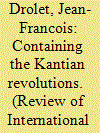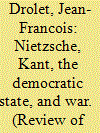| Srl | Item |
| 1 |
ID:
097914


|
|
|
|
|
| Publication |
2010.
|
| Summary/Abstract |
This article examines the neo-conservative critique of global liberal governance. It provides a theoretically oriented assessment of the neo-conservative case against international law and human rights regimes, and draws out the main political and ethical implications for American democracy and American foreign policy. It is argued that the neo-conservative critique of global governance rests upon an interpretation of the normative order that weaves together democracy, individual rights and national autonomy through a volatile identity politics which is fundamentally at odds with both the pluralist character of 'Westphalian diplomacy' and the universal order of rights envisaged by advocates of global governance. More than just the policy autonomy of the US, what is really at stakes in those debates for neo-conservatives is the whole structure of cultural and socio-economic interests that is tied to the substantive interpretation of democracy upon which their domestic commitments to neo-liberal capitalism and liberal freedoms are predicated.
|
|
|
|
|
|
|
|
|
|
|
|
|
|
|
|
| 2 |
ID:
118952


|
|
|
|
|
| Publication |
2013.
|
| Summary/Abstract |
This article offers a reconstruction of Nietzsche's critique of Kant's scheme for perpetual peace distilled from his life-long confrontation with Kant's critical philosophy. Through this reading strategy, it sheds light on Nietzsche's controversial and yet surprisingly under-researched reflections on the problem of conflict and war in human affairs. Although Nietzsche embraced many of the basic premises of Kant's critical philosophical project, he considered the ethico-political conclusions Kant drew from these to be both irrational and nihilistic. From Nietzsche's perspective, Kant's thoughts on politics and International Relations rest on a fundamental misunderstanding of the phenomena of agency, statehood, and war that elides both the tragic relationship between politics and culture, and the violence which Nietzsche believes to be latent in all attempts at reconciling individual with collective autonomy. According to Nietzsche, Kant's influential association between liberal republicanism, freedom, and peace contributed unwittingly in ushering in the cult of the nation-state, which Nietzsche warned would engulf Europe into a wholly new kind of organised violence in the coming decades. Although clearly not without their uncritical assumptions and hubristic tendencies, Nietzsche's reflections on war and peace draw attention to some of the more insidious risks and difficulties attending liberal attempts at accommodating cosmopolitan values and principles within the framework of the modern nation state.
|
|
|
|
|
|
|
|
|
|
|
|
|
|
|
|
| 3 |
ID:
164364


|
|
|
|
|
| Summary/Abstract |
Challenges to the liberal international order have tended to focus on the politics of populism most often traced to reactions against economic dislocation and mass migration. Parts of this portrait are undoubtedly true, but it also risks being deeply misleading. To fully understand the nature and depth of contemporary far-right movements, we need to examine more closely the distinctive ideological movements that inform and animate them. This article explores one specific articulation of these movements: US paleoconservatism. Although relatively unknown in the mainstream media, this anti-establishment strain of radical conservatism has provided intellectual ammunition to a wide range of agents and ideological forces challenging the prevailing liberal order nationally and internationally, including important parts of the anti-liberal politics of foreign policy under President Donald Trump.
|
|
|
|
|
|
|
|
|
|
|
|
|
|
|
|